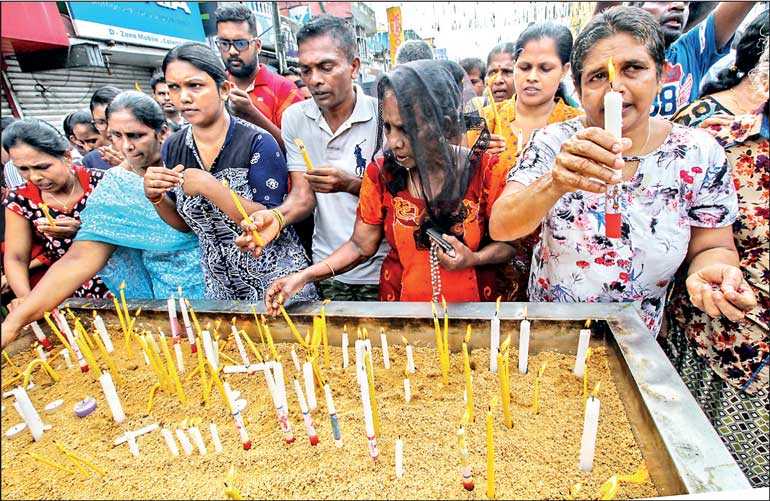Monday Feb 16, 2026
Monday Feb 16, 2026
Friday, 3 May 2019 00:00 - - {{hitsCtrl.values.hits}}

By Revd. Keerthisiri Fernando
Following the Easter Sunday disaster in Sri Lanka people have once again been asking the age old question; “why do innocent people suffer?” Despite all human advancement, this remains a question that cannot be answered with

absolute certainty. Then how can we wrestle with this issue which the entire world faces regardless of the divisions of class, caste, religion and ethnicity, etc.? In this process our faith, philosophies, values, attitudes and other such qualities become vital.
Throughout history religions have been presenting ideas and philosophies to enable people to come to terms with the suffering they face in this world. Religions such as Hinduism have shown that one has to suffer because of the deeds or karma of previous births. Although Buddhists basically accept this theory, Buddha had indicated that there are other natural disasters, unrelated to any prior life, but which also affect humanity. Religions such as Christianity, Islam and Judaism have been assuring their believers that although these terrible events happen, God or the ultimate reality (deity perhaps) is in control of everything.
In the 21st century with the development of modern communications such as the internet and email all religious philosophies are accessible to people in towns and villages throughout the world. In this situation people without any formal religious learning are influenced by these old faiths. The assumption that only so called “religious people” are influenced by these beliefs and philosophies are further disproved by the ways in which followers of many religious philosophies (and none) have come together in bringing relief and consolation to victims of the recent Easter Sunday disaster.
This huge outpouring of care and love for our fellow human beings regardless of religious beliefs and philosophies is a great inspiration to our apparently secular society. This highlights the “spirituality” of human beings, and goes far beyond the labels of religious affiliations. In this world where people kill each other for money, power and other base motives this human made disaster has proved that the “divine qualities” of human beings are not lost.
Study of many religions show that innocent suffering both as individuals and communities is redemptive and open the hearts and mind of even some evil people. In the 20th century this reality was effectively proved by the lives and work of people such as Gandhi, Martin Luther King and Mandela.
Therefore this disaster which was beyond human scientific comprehension has at least taught us human beings two lessons. First of all the frailty and limitations of human knowledge, despite all the advancement that has taken place in the world. Secondly, the positive effect of the power of innocent suffering, which unites humanity irrespective of all human barriers, has been affirmed by this disaster.
In a world where some evil people tend to think that they control the destiny of humanity, this human made catastrophe has reminded us that all human beings are equal and that we need one another to live in this world.
Let this Easter disaster be a source of inspiration to the world so that we rediscover the dependent nature of humanity on this planet.
(The writer is Bishop of Kurunegala, Church of Ceylon.)